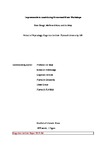Improvements in mood during Greenwood Music Workshops
| dc.contributor.author | Keogh, K | |
| dc.contributor.author | Atkins, M | |
| dc.contributor.author | May, Jon | |
| dc.contributor.other | Greenwood Music | |
| dc.date.accessioned | 2017-06-14T15:01:03Z | |
| dc.date.accessioned | 2017-06-15T09:03:00Z | |
| dc.date.available | 2017-06-14T15:01:03Z | |
| dc.date.available | 2017-06-15T09:03:00Z | |
| dc.date.issued | 2017-05-04 | |
| dc.identifier.other | 2017-JM | |
| dc.identifier.uri | http://hdl.handle.net/10026.1/9481 | |
| dc.description.abstract |
We report a service evaluation of the influence that making simple percussive instruments in natural and urban settings has on mood. Thirty-five out of the forty-eight vulnerable adults aged 18-68 successfully filled out a modified DASS 21 at the beginning and end of a three-day workshop. Six of the participants completed the workshop in an urban setting to offer a direct comparison between that and a natural setting of a woodland, with the phenomenon of biophilia taken into consideration. Due to the personal circumstances of nine participants, another course took place in a semi urban indoor environment. There was a decrease in depression, stress and anxiety across both urban and natural environments. The urban mood ratings improved more than those in the natural setting, but the mood ratings in the natural setting were better overall. Individual feedback given by volunteers about the course is explored in the discussion. | |
| dc.format.extent | 1-1 | |
| dc.language.iso | en | |
| dc.publisher | University of Plymouth Cognition Institute | |
| dc.relation.ispartof | Cognition Institute Report | |
| dc.relation.replaces | http://hdl.handle.net/10026.1/9478 | |
| dc.relation.replaces | 10026.1/9478 | |
| dc.subject | psychology | |
| dc.subject | mood | |
| dc.subject | stress | |
| dc.subject | depression | |
| dc.subject | anxiety | |
| dc.title | Improvements in mood during Greenwood Music Workshops | |
| dc.type | report | |
| plymouth.author-url | http://www.plymouth.ac.uk/staff/jon-may | |
| plymouth.confidential | false | |
| plymouth.publication-status | Published online | |
| plymouth.organisational-group | /Plymouth | |
| plymouth.organisational-group | /Plymouth/Faculty of Health | |
| plymouth.organisational-group | /Plymouth/REF 2021 Researchers by UoA | |
| plymouth.organisational-group | /Plymouth/REF 2021 Researchers by UoA/UoA04 Psychology, Psychiatry and Neuroscience | |
| plymouth.organisational-group | /Plymouth/REF 2021 Researchers by UoA/UoA04 Psychology, Psychiatry and Neuroscience/UoA04 REF peer reviewers | |
| plymouth.organisational-group | /Plymouth/Research Groups | |
| plymouth.organisational-group | /Plymouth/Research Groups/Centre for Brain, Cognition and Behaviour (CBCB) | |
| plymouth.organisational-group | /Plymouth/Research Groups/Centre for Brain, Cognition and Behaviour (CBCB)/Behaviour | |
| plymouth.organisational-group | /Plymouth/Research Groups/Institute of Health and Community | |
| plymouth.organisational-group | /Plymouth/Users by role | |
| plymouth.organisational-group | /Plymouth/Users by role/Academics | |
| dc.publisher.place | Plymouth | |
| dc.rights.embargoperiod | Not known | |
| rioxxterms.licenseref.uri | http://www.rioxx.net/licenses/all-rights-reserved | |
| rioxxterms.type | Technical Report |


